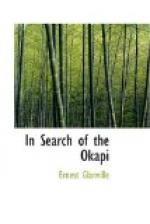“How do you account for people living down here?” asked Venning.
“They may be outcasts from the village, afflicted either by disease or madness, or they may be members of some dark superstition.”
“Ugh! I wonder if the Inkosikasi has any connection with them?”
“I rather think so, and when we get out we will have a word with her.”
“When we get out! But it will be fine to see old Dick again, and to see the birds and insects on the move in the sun. Halloa! the path turns again—bends to the left.”
“Keep on slowly.”
As they went the noise of waters again reached them, growing in volume; and when the path turned abruptly to the right, they looked out through a small opening on billows of mist that rolled upwards out of sight.
“Seem to have reached a spot above last night’s resting-place.”
The wall on their left was very thin, and shook to each report; but presently the passage made a bend to the right, which took them away once more from the mist-laden vault, and then, through a narrow doorway, opened into one of the best-lighted caverns they had yet entered. The light which streamed in from the wall beyond was very welcome to them, but the taste of earth in the air blowing through the crack was better. The first thing they did was to run across to the crack and look out.
“The river—and the valley!” cried Venning.
Below them was the green of the valley bathed in sunshine, the river glittering like silver, and the scene like a glimpse of Paradise after the gloom of their vast prison.
“There goes the eagle we saw when we first arrived, and right away yonder I can see a flock of goats among the rocks.”
“Perhaps we could get through and climb down.” Mr. Hume thrust an arm through, and spread his fingers to the wind. “We are on the south-west side of the cliff, nearly overlooking the entrance to the canon.”
“It is very steep there. We should want a rope—and a long rope, too.”
“Yes, I am afraid we must keep on; but, at any rate, it is a comfort to know where we are.”
They stepped back and turned to examine the cavern. The floor was dry, the roof high, and it would have made a good room. And a room in occupation it was; for, now they took stock of it, there were signs of the occupants everywhere—a stack of wood in one corner, several karosses rolled up, sleeping-mats, cooking-pots, wooden spoons, a bundle of reeds for arrow-making, and a half-shaped bow, and other odds and ends. But what fixed their attention were a number of white objects on a ledge.
“Look like ostrich eggs,” said Venning, reaching up “No, they’re not. Skulls—Ethiopian.”
“Pah! Drop it,” said Mr. Hume.
“Why?” said Venning, who had no qualms in these matters. “You can see it is Ethiopian from the receding forehead, the high cheek-bones, the heavy under-jaw and strong teeth. No white man ever has teeth like that.”




